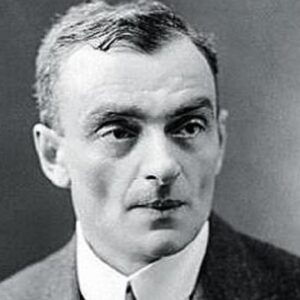Oscar Milosz was a poet who was born in France and raised in Lithuania. While he was mostly unknown at the time, he went on to become a key character in turn-of-the-century poetry. He was a poet, dramatist, essayist, fiction writer, and a collector of Lithuanian folk tales who subsequently became a respected diplomat representing Lithuania at the League of Nations. At the age of 12, he was sent to school in Paris after growing up in the countryside of modern-day Belarus. His early works, such as Le Poème des Décadencesn (1889), are marked by his isolation and sorrow apart from his family. He is reported to have had a divine vision in 1914 while studying Emanuel Swedenborg and Dante Alighieri, which forever changed his style. Milosz is best known today for his more mature and picture-heavy style, which is rich in alchemical symbolism, Christian cosmology, and isolated imagery. He was drafted into the Russian army during World War I. He became associated with the Lithuanian independence movement around this time. When Lithuania gained independence, he rose to become the new country’s top ambassador in France. He wrote three plays, two novels, and an astonishing quantity of poetry, the most of which were only lately collected into collections.
Childhood and Adolescence
Oscar Vladislas de Lubicz Milosz was born on May 28, 1877, in Areja, which was then under Russian rule.
Vladislasde Lubicz Milosz, his father, was a former Russian army colonel. Marie Rosalie Rosenthal, his mother, was a Warsaw Jew.
On July 2, 1886, he was christened at Warsaw’s St. Alexander Roman Catholic Church.
His parents raised him as their only child. His parents did not marry until he was seventeen years old.
He was sent to secondary education at Lycée Janson de Sailly in Paris in 1889 when he was 12 years old.
He stayed in Paris after finishing high school to study Mediterranean civilizations, Egyptian antiquities, Assyrian and Hebrew.
From 1896 to 1899, he studied under Professor Eugéne Ledraina at the École spéciale des Langues Orientales, where he learned to interpret antique Hebrew bibles.
Career of Oscar Milosz
While traveling throughout Europe and North Africa in 1889, he wrote his first poem, Le Poème des Décadences.
Les Sept Solitudes, a poem he wrote in 1906, was published with the support of poet Nicolas Beauduin.
Les Elements, a poem he wrote in 1911, exemplifies his younger, darker literary style.
In 1913, he released Miguel Maara: mystère en six tableaux, and in 1919, he published Méphisobeth.
He published smaller poetry from 1915 to 1922, preferring to concentrate on his plays and articles. Nihumim, Adramandoni, and La Confessions de Lemuel were the poems in question.
He began studying alchemy in 1914 after reading Emanuel Swedenborg’s books. His poems became more original and structured after 1914, by chance.
During World War I, Milosz was obliged to join the French Navy press corps, which was commanded by Russians.
His estate was confiscated during the Russian Revolution in 1917, only to be recovered to him by the French in 1920. He was penniless during this time because his compositions were never favorably received.
Between 1930 and 1933, he released Contes et Fabliaux de la vieille Lithuanie and Contes lithuaniens de ma Mère l’Oye, two collections of Lithuanian folk tales. Both of these documents were translated into English.
Major Projects of Oscar Milosz
In 1910, he released his only novel, ‘L’Amoureuse Initiation.’ It’s a narrative of an 18-year-old man’s passion and jealousy as he grows up in Venice.
In 1924, he released Ars Magna, a philosophical essay that would go on to become one of his most famous works.
Les Arcana, a collection of 106 poetry that would subsequently become his most famous metaphysical and cosmological work, was released in 1927. He declared his poetic career over when it was released.
Psalm of the Morning Star, his final poem, was published in 1933, just three years before his death.
Achievements & Awards
He was named Chargé d’Affaires, a prominent position as a French diplomat and businessman in charge of the newly formed Lithuania, in 1920.
In 1931, he was granted French citizenship and the Légion d’honneur, the country’s highest accolade.
Personal History and Legacy
He wasn’t married and didn’t have any kids.
He died of a heart attack on his Fontainebleau Estate on March 2, 1939, while battling cancer at the age of 61.
The Les Amis de Milosz Poet Society installed a memorial at the Fontainebleau Estate, where he died, in 1966. Every year on the anniversary of his death, the group gathers there.
The first volume of his work, ‘The Noble Traveller,’ was not released until 1985. This collection of English-language poetry, essays, and verse is largely responsible for Milosz’s current prominence.
Composer Andris Dzenitis gathered his poems into ‘Books of Silence’ in 2004.
Oscar Milosz Net Worth
Oscar is one of the wealthiest poets and one of the most well-known. Oscar Milosz’s net worth is estimated to be $1.5 million, according to Wikipedia, Forbes, and Business Insider.
Trivia
He was a distant relative of Czesaw Miosz, a Polish writer and Nobel Prize laureate in 1980.
Milosz was a devotee of the French symbolism poet Paul Fort, who helped him acquire recognition for his published works by writing favourable reviews.
He spoke French, German, English, Spanish, Italian, Polish, and Russian, among other languages. He also knew how to read Hebrew and Latin.
He famously declared, “I am a Lithuanian poet writing in French,” on March 29, 1919.
He predicted the end of the world in 1944 after studying alchemy and Christian meditation.


